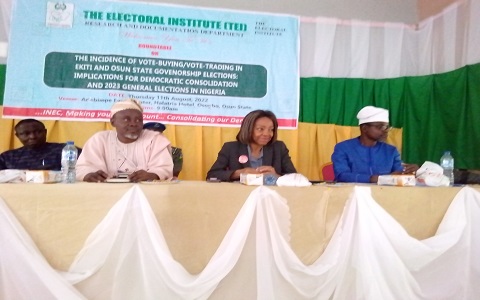

As part of measures to root out vote trading, and achieve free, fair, credible and acceptable 2023 elections in Nigeria, the Independent National Electoral Commission INEC has sought the support of critical stakeholders including the academia, Civil Society organizations and the media.
This was the focus of the roundtable organized by the Electoral Institute, the Research and Documentation Unit of INEC which took place in Osogbo, the Osun State capital.
The roundtable, which was on the ‘Incidence of Vote Buying and Trading in Ekiti and Osun Governorship Elections: Implications for Democratic Consolidation and 2023 General Elections in Nigeria’ suggested the need for Political will to enforce laws guiding elections.
Presenting the lead paper, former Executive Director of Civil Liberty Organization, CLO, Mrs Ayo Obe pointed out that the problem was capable of derailing the country’s democracy if it was not properly nipped in the bud.
Mrs Obe said it was important for all agencies saddled with the responsibility to enforce the Law.
“Tue problem is twofold, one is that we are not placing enough publicity about punishing those who are involved in the vote buying and selling. If you are caught selling or buying votes you should be made to face the Law. We should enforce the Law and people should see that the law is being enforced”.
“We saw some arrests and since then we do not know what has been happening. In Osun and Ekiti this happened some months ago, people should have been brought to trial and prosecuted by now.”
The human rights activist also said that it behoved people who did not want to sell their votes to come out during elections to outnumber those who wish to sell their votes.
Corroborating this position, one of the participants and a civil society activist, Mr Bukola Idowu berated poor handling of the criminal aspects of the Electoral Law since the return to Democratic governance, describing such as one of the major factors for the emergence of various unlawful means by politicians to circumvent the process.
Mr Idowu explained that the problem should not be discussed only during elections, but rather it should start with the primary of Political parties, most especially the major parties.
He suggested that the emoluments attached to political offices were encouraging unhealthy competition manifesting in vote trading
One of the participants, Professor Olabisi Aina who was represented by Mrs Adefisoye Ibironke noted that vote buying and trading was limiting female participation in the elective competition since women could not raise the huge money required for vote trading.
Earlier, in an address to declare the discourse open, the Chairman of the Board of the INEC Electoral Institute, Professor Abdullahi Abdu Zuru described vote trading as a disturbing issue in the conduct of free, fair, credible and accepted outcome of the election meant to consolidate the nation’s Democracy.
The Osun State Resident Electoral Commissioner, Professor Abdulganiy Raji who delivered the address argued that voting should be in terms of the performance of political gladiators and the willingness of the people to re-elect them based on the fulfilment of their promises.
“What I am saying is that you must ensure that when you are campaigning, you have achievable promises, and when you are in office, you fulfil your promises, it means you are buying votes, but not paying for buying the votes, People would not hesitate to sell their votes to you without collecting Kobo, because you have fulfilled your promises. That is what I mean by vote buying”.
In a welcoming address, the Director General of the electoral institute, Dr Sa’ad Umar Idris charged Nigerians of good conscience not to give up and submit to vote buying/trading as an insurmountable challenge.
Adenitan Akinola
Subscribe to ourTelegram channel